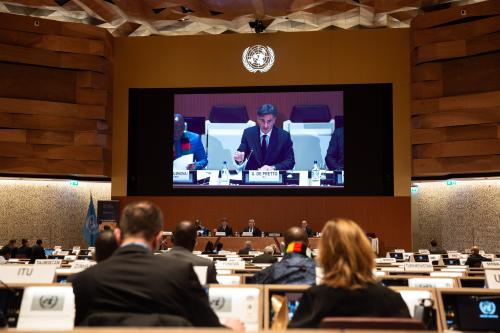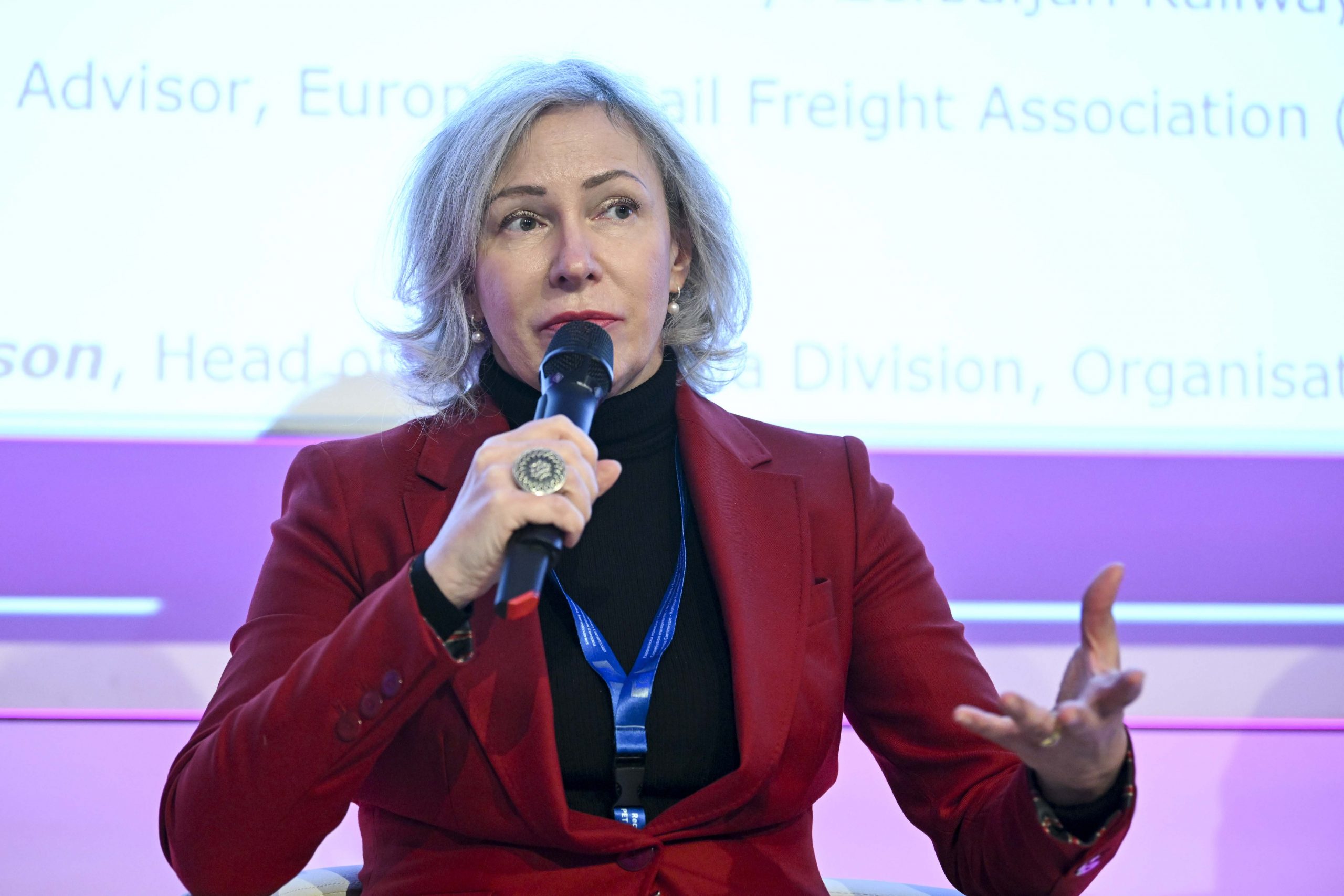
27 FEB 2024 · PROSPERITY
IRU was at the heart of the 86th Inland Transport Committee (ITC) debates last week, outlining key decarbonisation and trade facilitation opportunities ahead.
It was a busy week in Geneva. Road transport actors from around the world were in town for the 86th ITC session, including delegations from the UN Economic Commission for Europe (UNECE)’s 56 member states and far beyond.
The week featured ITC working group meetings, including on road traffic safety, vehicle regulation harmonisation, the transport of dangerous goods, border crossing facilitation, and intermodal transport.
The 86th session also included a host of events and bilaterals. Here’s a snippet of IRU’s participation and high-level meetings.
Leading decarbonisation debate
On Tuesday, kick-off day, the efficient decarbonisation of road transport took centre stage, with IRU Secretary General Umberto de Pretto moderating a high-level ministerial panel on how to accelerate the decarbonisation of road transport.

Setting the scene, Umberto de Pretto initiated the discussion by highlighting that “the road transport industry is committed to become carbon neutral by 2050. The IRU Green Compact offers a pragmatic and realistic decarbonisation pathway to ensure that our industry can continue to meet increasing transport demand. But we need to move from ambition to action. With global coordination and genuine public-private partnerships, we can get it done.”
“We cannot wait for 2050 and then press the ‘magic button’. We need to pursue a mix of different policies right now. Governments need to provide enabling conditions that will allow transport operators to drive immediate efficiency wins, therefore cut CO2 emissions, as well as to invest in alternative fuel technologies over the longer term,” he added.
The panellists agreed that decarbonisation requires a holistic approach that leaves no one behind and incorporates economic development, social equity and environmental protection. They also emphasised the key role of UNECE in harmonising, coordinating and integrating approaches regionally and globally.
Sustainability side event
Then on Thursday, Umberto de Pretto was a panellist on a roundtable organised by the Permanent Mission of Turkmenistan to the United Nations Office at Geneva (UNOG), titled “Towards Sustainable Transportation: Best Practices, Challenges and Solutions”, which was moderated by Vepa Hajiyev, the Ambassador and Permanent Representative of Turkmenistan to UNOG.
IRU’s intervention focused on two key topics: World Sustainable Transport Day and decarbonisation.
Umberto de Pretto said, “As we’ve seen time and time again, road transport turns landlocked countries, such as Turkmenistan, into land-linked transport hubs. That’s one reason why we were delighted to see Turkmenistan champion and successfully advance the adoption of the UN World Sustainable Transport Day resolution.”
“Across the world, commercial road transport – trucks, vans, buses, coaches and taxis – is the lifeblood of economies and communities in all countries, moving people and goods across countries and continents. I encourage all governments to implement TIR and its IT tools to optimise border crossings and stop trucks from idling at borders for hours and days on,” he added.
Green borders
Finally on Friday, IRU’s TIR and Transit Director, Tatiana Rey-Bellet, unpacked how TIR and border-cross facilitation measures are helping the sector to decarbonise during UNECE’s roundtable titled “Fostering the digital and green transition for inland transport in support of the Sustainable Development Agenda”.
Following opening remarks by UNECE’s Deputy Executive Secretary (Dmitry Mariyasin) and Chief of Section, Transport Networks and Logistics, Sustainable Transport Division (Francesco Dionori), Tatiana Ray-Bellet highlighted how shorter border crossing times enabled by TIR can reduce CO2 emissions by up to 1 tonne per truck per journey:
“Efficient border crossings are a key pre-condition for efficient logistics. eTIR is expected to rachet up TIR’s border crossing time reductions, thus further cutting emissions, while removing other procedures which today lead to additional transport costs.”
“With eTIR, the transport of new and used TIR carnets between IRU and TIR associations, which is mostly done by air, won’t be necessary anymore. Furthermore, eTIR will make it much easier to bring TIR benefits to the service of intermodal transport, thus opening new opportunities for the efficient combination of different transport modes,” she added.
Tatiana Rey-Bellet further called on all TIR countries to accelerate their transition to eTIR.
“Since all necessary business-to-business and business-to-customs exchanges have been implemented, TIR countries need to complete the last remaining piece of connectivity: interconnection with the eTIR international system hosted by UNECE,” she concluded.
High-level bilaterals
Throughout the week, IRU also held high-level bilateral talks with international organisations and national delegations, including with Saudi Arabia and Türkiye on TIR and transport facilitation, and with Azerbaijan and the UN’s climate change body on preparatory work ahead of COP 29.
In a meeting with Daryush Amani, Iran’s Deputy Minister of Transport and the President of the Road Maintenance and Transport Organisation (RMTO), IRU and RMTO reviewed joint projects, including on driver training and certification projects, and agreed on next steps.
They also discussed how IRU can help RMTO to improve transit policies and procedures as well as physical controls and congestion at borders.
IRU held other high-level meetings, including with the Secretaries General of the International Transport Forum, the Black Sea Economic Cooperation, and the Economic Cooperation Organization (ECO).
Umberto de Pretto and ECO Secretary General Khusrav Noziri discussed avenues to strengthen public-private partnerships through the newly established ECO TIR Associations Consultative Group (TIRACG), underlining the importance of implementing the group’s recommendations in order to enact ECO’s initiatives to advance international transport and transit.
The two also touched on other pressing issues such as the digitalisation of transport and transit documents, including eTIR implementation, joint capacity-building activities, and visa facilitation for drivers.








